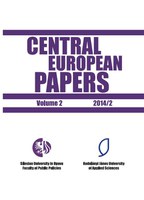Attempts to extend the suffrage in wartime Hungary – 1914–1918
Attempts to extend the suffrage in wartime Hungary – 1914–1918
Author(s): Irén SimándiSubject(s): History
Published by: Slezská univerzita v Opavě, Fakulta veřejných politik
Keywords: World War I; extension of suffrage in the wartime; the political parties for extension of suffrage; parliamentary debates of suffrage in 1917
Summary/Abstract: After the outbreak of "Big War" the role of the wartime hinterland has changed essentially. Some of the political parties and social organizations considered that men doing their military service in the war would have deserved the extension of suffrage and women in the wartime country would have deserved to gain suffrage. One of those political parties which had the biggest mass support performed political activity for the extension of suffrage. As the Social Democratic Party gained ground its increasing popularity brought about the establishment of the organization framework of the social democratic women's rights movement, and this then reinforced its activity, launching a journal called 'Nőmunkás' (The Woman Worker). The journal described the struggle, everyday problems, means of subsistence faced by women and the parliamentary debates concerning female suffrage that did not yield a result until December of 1917. One of the most significant of the social organizations was the Association of Feminists which was founded in Hungary on 18 December 1904. Endeavours in the direction of political emancipation of women and the suffrage movement became the central aim of their activity. The journal of the Association titled "A Nő" (The Women) covered almost all of their programmes, described how the situation and position of women changed due to the war and called attention to the debates concerning suffrage and published the various views of politicians and political parties. The first significant breakthrough in these debates was a bill that was brought in the parliament by Vilmos Vázsonyi, a minister without portfolio on 21 December 1917. He was the first member of a government who was willing to provide suffrage for women even though based on qualifications. His bill aroused an important dispute among common people and politicians too. Despite of all his efforts and political arguments the bill he proposed was not supported thus the law that was passed in the parliament did not included female suffrage.
Journal: Central European Papers
- Issue Year: 2/2014
- Issue No: 2
- Page Range: 108-121
- Page Count: 14

